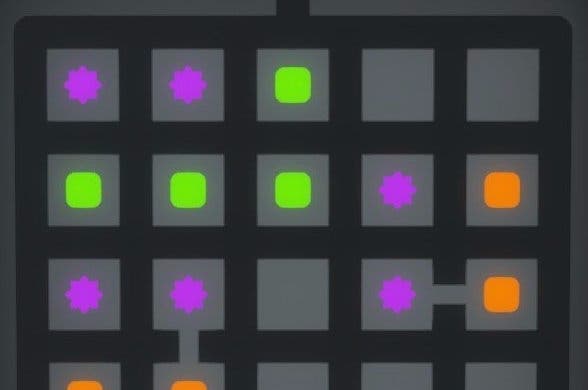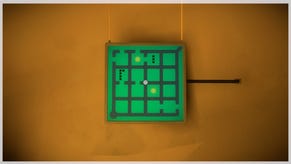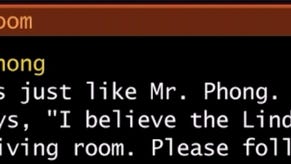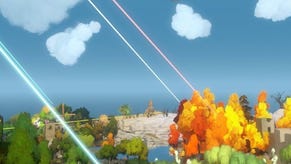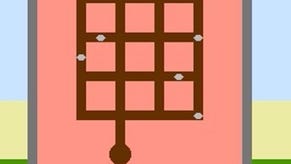In Play: Why getting stuck in The Witness is good for you
"You are smart, you can do it!"
In Play is a new column taking a weekly sideways look at new game releases. It's a bit like our old series Game of the Week, if you remember that.
I want to talk about getting stuck.
I've whiled away a few hours this week with Churchill Solitaire. The is the iOS card game that caused a minor stir this week because it purports to resurrect a lost variant of solitaire invented by no less than Winston Churhill, and because it's brought to us, weirdly, by the game's self-appointed custodian on this mortal coil: former US defence secretary Donald Rumsfeld. (Check out Wired's review in the style of Rumsfeld himself.)
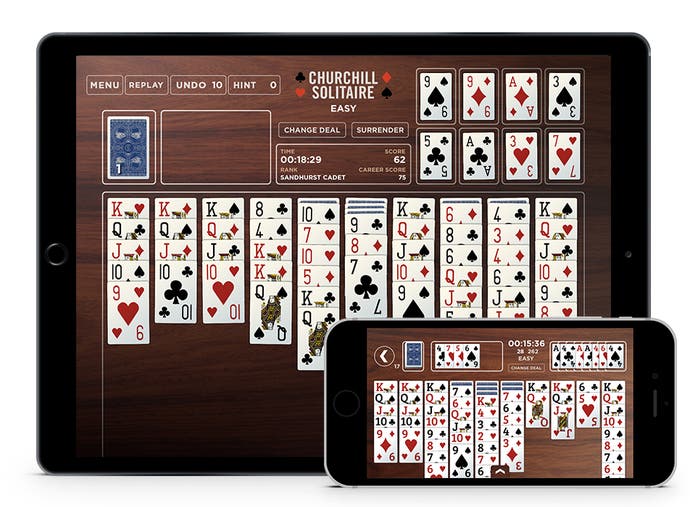
There's an enjoyably high WTF factor in all this, but my first thought was quite different: new solitaire game! As I wrote recently, I am a solitaire nut, so I was excited to try out Churchill's supposedly super-hard two-pack variant. Based on my experience with the app, I would give the indomitable wartime PM a job as a games designer - though not perfectly balanced and given to an anticlimactic endgame, his solitaire rules are both simple and testing - but I would not hire Rumsfeld as a producer. This app's many sins include a poor frame-rate (in a solitaire game), a buggy interface, a silly story (in a solitaire game) and ridiculous overproduction. Worst of all, though, is the message that pops up when you leave the game idle for just a minute or so: "You look stumped. Surrender?"
Since Rumsfeld has made big claims about the game's challenge and strategic depth, this message isn't just an irritation, it displays a depressing lack of faith in both the game and the player. When a puzzle or strategy game leaves you staring at the screen or board in deep thought for minutes on end, well, that's when you know it's cooking with gas. Nobody ever claimed chess was broken, and yet most video game makers regard a player getting "stuck" in a game as a bug that needs fixing - as if getting stuck in the logic and stuck in the scenery were the same thing.
Take a look at this week's other new releases. Now, no-one's going to judge Lego Marvel's Avengers for being a game that always seeks to ease players toward the next accomplishment - it's for kids, right? But Traveller's Tales' well honed box-ticking formula isn't making just this series a bit stale, as Graeme noted in our review. The Lego games have been more influential in mainstream gaming than you might think.
Can't you detect something of their mania for gear-gating, collectables and progress bars in, say, Rise of the Tomb Raider? A new PC version of Crystal Dynamics' polished adventure - which, according to Digital Foundry, is handsome but demanding of your hardware - was released this week alongside a new story episode for all versions, Baba Yaga. One of the things I liked best about this game when I reviewed it last year was that it features some very cleverly designed puzzles, but these have been sidelined in the clunkily named Optional Challenge Tombs - because heaven forbid that anything in this smoothly paced romp should force the player to stop in their tracks for a second. In Rise of the Tomb Raider, violence is compulsory, but thinking is optional.
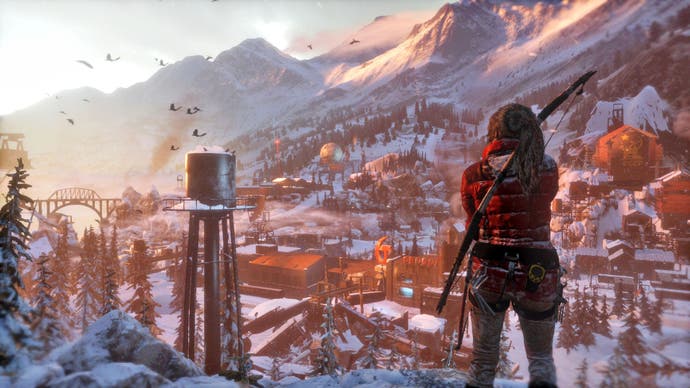
I guess this is one of the many reasons major publishers and studios are attracted to the template for endless gaming first popularised by massively multiplayer RPGs and now bleeding into console action gaming via the likes of Destiny and The Division, the beta of which is live right now. The choice between easy progress and thoughtful challenge isn't one you have to make in these games - at least not until you're hundreds of hours in. Progress is constant, progress is the game, and the depth resides in discovering the perfectly optimised character build to maximise that progress. That's not to say this can't be an engaging process - this is a Diablo fan writing - but the challenge is quite deliberately quarantined in the menus, and brute-force grinding is always an alternative, because the player must always be moving forward at all costs. But really, must we?
This isn't just an argument about dumbing down, about games being too easy. In fact, fetishised gloom and hardship permeate a lot of the games we choose to love these days, from Dark Souls to Darkest Dungeon. In fashionable survival games and roguelikes, we consider it thematically appropriate, and even oddly rewarding, to fail. A great example is This War of Mine, which arrives on consoles this week. "Characters are cogs in a machine that has no margin for error. This is base-building with no comfort," wrote Bertie about this agonising wartime survival game. But failing, even when we feel good about feeling bad about it, is not the same thing as getting stuck. In some games, getting stuck is the path to success. It's part of the gameplay; part of the plan.
Witness the fitness
This was brought to mind this week by The Witness, a phenomenal game which "makes art out of puzzles", I wrote in my review. Its puzzles, all based around solving a maze, are often difficult. Sometimes that's because they require big conceptual leaps to understand what you're meant to do, sometimes it's because they layer several different rules at once, and sometimes it's because they require you to think against the flow the game has previously established. The result? You get stuck.
There are solutions out there now, of course, and its designer Jonathan Blow took to Twitter to this week to implore players not to use them. "I see a lot of people going to forums immediately if they can't figure something out. Don't do that! It makes your experience a lot worse," he tweeted. "You are smart, you can do it! If you don't know now, sleep on it. Take a walk. Watch a good movie or go to a different puzzle!"
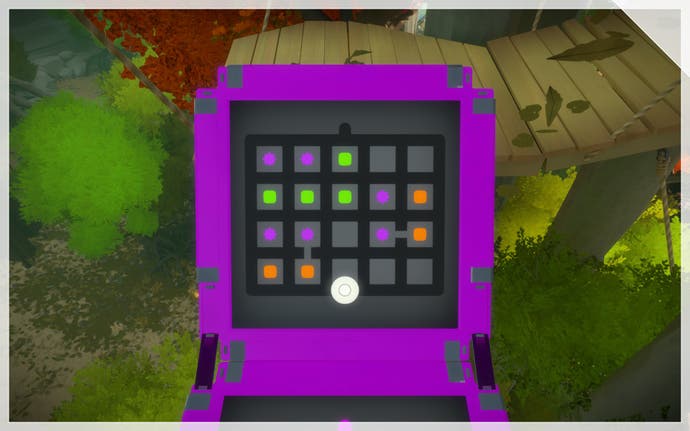
It might sound like a developer being precious about his creation, and of course it's your prerogative to play the game however you choose, but do you know what? He's dead right. I had no recourse to walkthroughs when playing the game for review, which could be worrying as my deadline loomed, but coming back fresh always worked. And the sense of satisfaction was huge.
This mental process is the absolute essence of the game. This is the emotional and intellectual arc Blow and his team have created for us: contemplation, advance and retreat down lines of thought, then the precious chance to feel that moment when your perception shifts and the path is revealed. At times, due to the nature of the puzzles, it's quite a profound feeling. Spoiling these moments for yourself is every bit as bad as spoiling the plot of a book or movie. In fact, it's worse, because you can still take pleasure in the telling of a story you already know, but following a puzzle solution just to advance to the next one is an empty and fruitless action.
We've been taught by so many games to respond to getting stuck with frustration. We've been conditioned to expect constant, unimpeded progress, to expect that every minute we spend in a game will supply a steady trickle of affirmation, of so-called experience. But sometimes the real progress, the real experience, comes from stopping. Sometimes it's found in a moment of stasis, waiting for insight to come. Sometimes, if you give up and turn your back on a problem, when you turn back to it you find you can see things differently, and the world has changed. You are smart. You can do it. No surrender.
